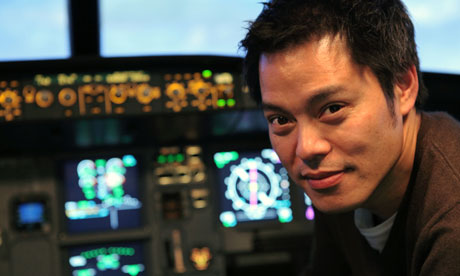
A couple of years ago I had an operation. I won't burden you with the details, but things didn't go quite as planned. I don't think my life was actually in danger, but I had some kind of fit and the doctors were concerned enough that when I came round I was in the intensive care unit (highly recommended by the way, you get your own personal nurse, almost like a butler). There was even an inquiry into what had gone wrong.
This happened at UCH in London, and having now seen the fascinating Horizon: How to Avoid Mistakes in Surgery (BBC2) I'm glad it did. Not just because that's where the excellent presenter Kevin Fong works as an an anaesthetist (you can put me to sleep any time you like, Doctor Kevin). But also because they have a simulation suite there, where doctors are trained in situational awareness, strategy design, hierarchy gradients (too steep = not good) etc. In plain English, that means not losing track of time passing, having clearly defined roles, and not being a dictator. Also recognising and accepting the perennial problem of human fallibility. Simulation is even used as part of selection criteria at UCH. Swotting up on your anatomy and knowing your pharmacology aren't enough to make you a good doctor.
I'm also glad that what happened to me happened only a couple of years ago rather than in 2005, say, when what happened to Elaine Bromily, terrifyingly reconstructed here, did. During a routine sinus operation, her airway became blocked. Under the stress of the situation three doctors failed to see the way that could have saved her (a tracheostomy), a nurse who could see didn't feel able to speak up about it (that's the too-steep hierarchy gradient), and Elaine died.
Fong looks at the lessons that came out of that tragedy, and also at how surgery has learned from other professions that involve making decisions in high-stress, high-risk, fast-moving situations – firefighting, flying planes and, perhaps most interestingly, Formula One pit crews. Look at it as tyre replacement surgery: the guy doing the fuel is the anaesthetist, the lollypop man is the top surgeon in overall charge, the ones who roll the old tyres away the nurses … perhaps the analogy isn't perfect. But anyway, the protocol this dude at Great Ormond Street designed was inspired by watching F1 pit crews, and children's lives have been saved because of it. Isn't that brilliant, and amazing?
One recent development – checklists, like the ones pilots use – seems so simple and obvious, but their use in the operating theatre can reduce mistakes by over 30%, and now they are used in all hospitals in the country. They weren't when Elaine Bromily died.
I don't know if there was a checklist in the room for my op, or if it has any bearing on anything. But I have decided to introduce one to my own high-pressure, high-risk working environment. So … TV? Check. Remote? Check. Notebook? Check. The Radio Times to see who's in it? Check. Right, everyone know what they're supposed to be doing? Oh, it's just me, and no, not really … but check, I guess. Jesus, if I was a doctor, I'd be soooo struck off.
Childbirth is the new Coronation Street, have you noticed? I mean every time – literally every time – you switch on the television these days, some poor woman in a strange position is yelling out in pain while a cheery midwife announces that she can see the head. Three times, here in Home Delivery (ITV), all in those paddling pools, and delivered at home by positive-thinking Virginia who used to be a stripogram. Two of them go swimmingly – paddlingly, at least. In the third, the baby doesn't start breathing immediately, so the ambulance crew who have been on standby outside rush in and take her to hospital. The baby's absolutely fine, but it's enough to persuade me at least that hospital's where they should have been in the first place.
It's eight-year-old Dylan I feel most sorry for. The son of Julie, who is now having another baby with new partner Anthony, Dylan has been invited to stay up to watch his new brother coming out. He's introduced to some of the paraphernalia. "What do you think I might use that for?" says Julie, holding up a sieve. Dylan's not sure. "Sometimes people, when they're having a baby, they accidentally go poo in the water," explains Julie. "Eurrgh," says Dylan. Exactly. I'm not sure any child should have to deal with even the thought of their mum's involuntary poo and fishing for it using a sieve.
And here we go again, in The Baby Bomb (BBC3), more howling, another home birth, in the paddling pool, on TV … Enough already.

